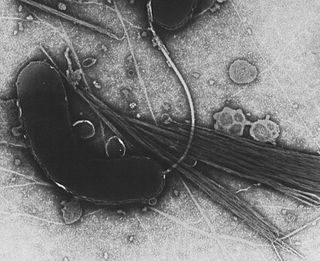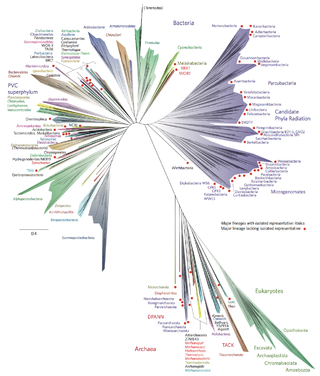Prabhu B. Patil | |
|---|---|
| Born | India |
| Nationality | Indian |
| Known for | Studies on Bacterial genetics, genomics and metagenomics |
| Awards |
|
| Scientific career | |
| Fields | |
| Institutions | |
Prabhu B. Patil is an Indian bacterial geneticist and a senior scientist at the Institute of Microbial Technology. [1] Known for his studies on bacterial genetics, genomics and metagenomics, Patil has published his research findings by way of a number of articles; [2] [note 1] ResearchGate, an online repository of scientific articles has listed 95 of them. [3] The Department of Biotechnology of the Government of India awarded him the National Bioscience Award for Career Development, one of the highest Indian science awards, for his contributions to biosciences, in 2017–18. [4]

Pseudomonadota is a major phylum of Gram-negative bacteria. Currently, they are considered the predominant phylum within the realm of bacteria. They are naturally found as pathogenic and free-living (non-parasitic) genera. The phylum comprises six classes Acidithiobacilia, Alphaproteobacteria, Betaproteobacteria, Gammaproteobacteria, Hydrogenophilia, and Zetaproteobacteria. The Pseudomonadota are widely diverse, with differences in morphology, metabolic processes, relevance to humans, and ecological influence.
Methanotrophs are prokaryotes that metabolize methane as their source of carbon and chemical energy. They are bacteria or archaea, can grow aerobically or anaerobically, and require single-carbon compounds to survive.

Sphingomonas was defined in 1990 as a group of Gram-negative, rod-shaped, chemoheterotrophic, strictly aerobic bacteria. They possess ubiquinone 10 as their major respiratory quinone, contain glycosphingolipids (GSLs), specifically ceramide, instead of lipopolysaccharide (LPS) in their cell envelopes, and typically produce yellow-pigmented colonies. The GSL serves to protect the bacteria from antibacterial substances. Unlike most Gram-negative bacteria, Sphingomonas cannot carry endotoxins due to the lack of lipopolysaccharides, and has a hydrophobic surface characterized by the short nature of the GSL's carbohydrate portion.

Acidithiobacillus is a genus of the Acidithiobacillia in the phylum "Pseudomonadota". This genus includes ten species of acidophilic microorganisms capable of sulfur and/or iron oxidation: Acidithiobacillus albertensis, Acidithiobacillus caldus, Acidithiobacillus cuprithermicus, Acidithiobacillus ferrianus, Acidithiobacillus ferridurans, Acidithiobacillus ferriphilus, Acidithiobacillus ferrivorans, Acidithiobacillus ferrooxidans, Acidithiobacillus sulfuriphilus, and Acidithiobacillus thiooxidans.A. ferooxidans is the most widely studied of the genus, but A. caldus and A. thiooxidans are also significant in research. Like all "Pseudomonadota", Acidithiobacillus spp. are Gram-negative and non-spore forming. They also play a significant role in the generation of acid mine drainage; a major global environmental challenge within the mining industry. Some species of Acidithiobacillus are utilized in bioleaching and biomining. A portion of the genes that support the survival of these bacteria in acidic environments are presumed to have been obtained by horizontal gene transfer.

Claire M. Fraser is an American genome scientist and microbiologist who has worked in microbial genomics and genome medicine. Her research has contributed to the understanding of the diversity and evolution of microbial life. Fraser is the director of the Institute for Genome Sciences at the University of Maryland School of Medicine in Baltimore, MD, where she holds the Dean's Endowed Professorship in the School of Medicine. She has joint faculty appointments at the University of Maryland School of Medicine in the Departments of Medicine and Microbiology/Immunology. In 2019, she began serving a one-year term as President-Elect for the American Association for the Advancement of Science (AAAS), which will be followed by a one-year term as AAAS president starting in February 2020 and a one-year term as chair of the Board of Directors in February 2021.

Gammaproteobacteria is a class of bacteria in the phylum Pseudomonadota. It contains about 250 genera, which makes it the most genus-rich taxon of the Prokaryotes. Several medically, ecologically, and scientifically important groups of bacteria belong to this class. All members of this class are Gram-negative. It is the most phylogenetically and physiologically diverse class of the Pseudomonadota.
Mycolicibacterium aubagnense is a species of the phylum Actinomycetota, belonging to the genus Mycolicibacterium.

Bacterial phyla constitute the major lineages of the domain Bacteria. While the exact definition of a bacterial phylum is debated, a popular definition is that a bacterial phylum is a monophyletic lineage of bacteria whose 16S rRNA genes share a pairwise sequence identity of ~75% or less with those of the members of other bacterial phyla.
Mitali Mukerji is a Professor and Head of the Department of Bioscience and Bioengineering, IIT Jodhpur. She was formerly a Chief Scientist at the CSIR Institute of Genomics and Integrative Biology with notable achievement in the field of human genomics and personalized medicine. She is best known for initiating the field of "Ayurgenomics" in partnership with her colleague Dr. Bhavana Prasher under the mentorship of Prof. Samir K. Brahmachari. Ayurgenomics is an innovative study, blending the principles of Ayurveda- the traditional Indian system of medicine- with genomics. Mukerji is also a major contributor in the Indian Genome Variation Consortium, a comprehensive database that is producing "the first genetic landscape of the Indian population", and has been an author in many publications that use IGV databases to study population genomics. Mukerji has done extensive research on hereditary ataxias, and is involved in many other projects related to tracking disease origins and mutational histories. She is the recipient of the prestigious Shanti Swarup Bhatnagar Award in 2010 for her contribution in the field of Medical Sciences.
Solibacillus is a genus of Gram positive, rod shaped, spore-forming bacteria.

Kaustuv Sanyal is an Indian molecular biologist, mycologist and a professor at the Molecular Biology and Genetics Unit of the Jawaharlal Nehru Centre for Advanced Scientific Research (JNCASR). He is known for his molecular and genetic studies of pathogenic yeasts such as Candida and Cryptococcus). An alumnus of Bidhan Chandra Krishi Viswavidyalaya and Madurai Kamaraj University from where he earned a BSc in agriculture and MSc in biotechnology respectively, Sanyal did his doctoral studies at Bose Institute to secure a PhD in Yeast genetics. He moved to the University of California, Santa Barbara, USA to work in the laboratory of John Carbon on the discovery of centromeres in Candida albicans. He joined JNCASR in 2005. He is a member of the Faculty of 1000 in the disciplines of Microbial Evolution and Genomics and has delivered invited speeches which include the Gordon Research Conference, EMBO conferences on comparative genomics and kinetochores. The Department of Biotechnology of the Government of India awarded him the National Bioscience Award for Career Development, one of the highest Indian science awards, for his contributions to biosciences, in 2012. He has also been awarded with the prestigious Tata Innovation Fellowship in 2017. The National Academy of Sciences, India elected him as a fellow in 2014. He is also an elected fellow of Indian Academy of Sciences (2017), and the Indian National Science Academy (2018). In 2019, he has been elected to Fellowship in the American Academy of Microbiology (AAM), the honorific leadership group within the American Society for Microbiology.
Endozoicomonas is a genus of Gram-negative, aerobic or facultatively anaerobic, chemoorganotrophic, rod-shaped, marine bacteria from the family of Endozoicomonadaceae. Endozoicomonas are symbionts of marine animals.

Rup Lal is an Indian molecular biologist known for his work in molecular biology, genomics, metagenomics and taxonomy of microbial diversity inhabiting extreme niches. His research has led to the development of novel analogue of rifamycin, identification and functional characterization of microbial communities at Manikaran hotsprings and deciphering the role of microbes in degradation of Hexacholorocyclohexane (HCH) at a polluted dumpsite located at Ummari village, Lucknow, India. He has over 35 years of strong and longstanding experience in administration, teaching and research in various capacities at University of Delhi, India. Presently, he is NASI Senior Scientist Platinum Jubilee fellow at The Energy and Resources Institute (TERI), Delhi.

Natalie Anne Prystajecky a Canadian biologist and the Environmental Microbiology program at the British Columbia Centre for Disease Control Public Health Laboratory. She holds a Clinical Assistant Professor position at the University of British Columbia. During the COVID-19 pandemic Prystajecky was involved with the development COVID-19 testing capabilities.
Gracilibacteria is a bacterial candidate phylum formerly known as GN02, BD1-5, or SN-2. It is part of the Candidate Phyla Radiation and the Patescibacteria group.
Thiodictyon is a genus of gram-negative bacterium classified within purple sulfur bacteria (PSB).
Mycobacteroides is a genus of Gram-Positive rod-shaped bacteria in the family Mycobacteriaceae from the order Mycobacteriales.

Ivan Erill is a Spanish computational biologist known for his research in comparative genomics and molecular microbiology. His work focuses primarily on bacterial comparative genomics, through the development of computational methods for analyzing regulatory networks and their evolution.
Mycobacteroides saopaulense is a species of bacteria from the phylum Actinomycetota belonging to the genus Mycobacteroides that was first isolated from a human patient undergoing LASIK surgery. It has also been isolated from turtles and cows. A strain isolated from mangroves has been demonstrated to produce clavulanic acid and streptomycin. The genome of M. saopaulense contains a tRNA array that contains a long non-coding RNA called GOLDD. M. saopaulense is susceptible to amikacin, kanamycin, and clarithromycin.
Mycolicibacterium agri is a species of bacteria from the phylum Actinomycetota that was first isolated from soil. It is non-pigmented and grows rapidly at 25–45 °C on Ogawa egg medium. It has also been isolated from a human skin infection, and raw milk M. agri is capable of degrading octocrylene.